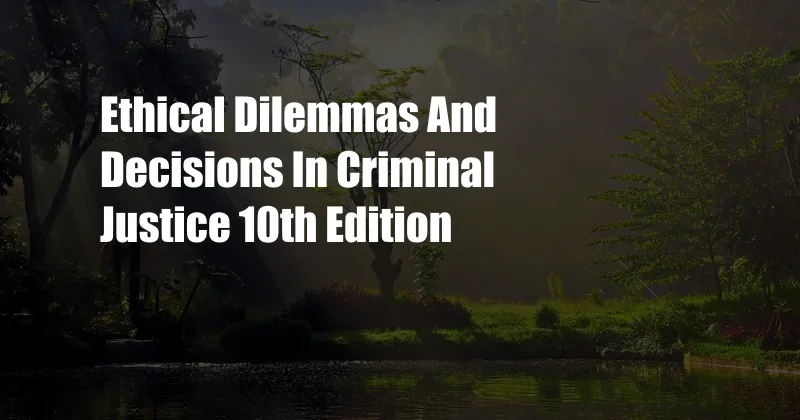
Ethical Dilemmas and Decisions in Criminal Justice, 10th Edition
As a young criminal justice student, I eagerly delved into the intricacies of the field, consumed by a passion for upholding justice and protecting society. However, I soon discovered that the path of a criminal justice professional is not always clear-cut, and the decisions we make can have far-reaching consequences. One of the most compelling aspects of criminal justice is the exploration of ethical dilemmas and the complex choices that arise within the system.
Ethics in criminal justice encompass the moral principles that guide the conduct of professionals in the field, ensuring fairness, impartiality, and respect for human dignity. However, ethical dilemmas can surface when these principles clash in real-world situations, forcing individuals to make difficult decisions.
Balancing Justice and Mercy
One of the most prevalent ethical dilemmas in criminal justice is the tension between justice and mercy. The pursuit of justice demands punishment proportionate to the crime committed, while mercy seeks to temper justice with compassion, considering mitigating circumstances and the potential for rehabilitation.
In cases involving first-time offenders or individuals with mental health issues, criminal justice professionals may grapple with the question of whether a strict adherence to justice serves the greater good or whether mercy might offer a more just outcome that promotes rehabilitation and protects society in the long run.
Protecting Society versus Individual Rights
Another ethical dilemma stems from the conflict between protecting society and safeguarding individual rights. Law enforcement officials often face situations where apprehending criminals or preventing crimes may require infringing on personal freedoms, such as conducting searches or obtaining confessions.
Balancing the need for public safety and the preservation of civil liberties poses a significant ethical challenge. Criminal justice professionals must carefully consider the necessity and proportionality of their actions, ensuring that individual rights are not sacrificed in the pursuit of protecting society.
The Role of Bias and Prejudice
Bias and prejudice, whether conscious or unconscious, can cloud ethical decision-making in criminal justice. Racial profiling, for example, has been a persistent issue in law enforcement, leading to disparate treatment and unfair outcomes for individuals from minority groups.
Recognizing and combating bias is crucial for upholding the integrity of the criminal justice system. Criminal justice professionals must be vigilant in challenging their assumptions and examining their own prejudices, striving to make decisions based on facts and evidence rather than stereotypes or biases.
Dilemmas in Sentencing
Sentencing decisions in criminal justice present their own set of ethical challenges. Factors such as the severity of the crime, the offender’s history, and the potential for recidivism must be carefully weighed.
Ethical dilemmas may arise when the sentencing range for a particular crime allows for a wide range of punishments. Criminal justice professionals must consider the appropriate balance between retribution, deterrence, incapacitation, and rehabilitation, striving to ensure that the sentence is both just and fair.
Tips and Expert Advice for Navigating Ethical Dilemmas
Navigating ethical dilemmas in criminal justice requires a combination of ethical principles, critical thinking skills, and practical experience. Experts in the field have offered valuable advice for making informed and ethical decisions:
- Consult Ethical Guidelines and Professional Codes: Numerous ethical guidelines and professional codes provide guidance for ethical behavior in criminal justice. Familiarize yourself with these resources and seek advice from colleagues, supervisors, or ethics committees when faced with ethical dilemmas.
- Engage in Moral Reasoning: When confronted with an ethical dilemma, engage in a structured process of moral reasoning. Identify the relevant facts, consider different perspectives, weigh the potential consequences, and apply ethical principles to reach a reasoned decision.
FAQs on Ethical Dilemmas in Criminal Justice
Q: What are some common ethical dilemmas in criminal justice?
A: Common ethical dilemmas include balancing justice and mercy, protecting society versus individual rights, the role of bias and prejudice, and dilemmas in sentencing.
Q: How can criminal justice professionals navigate ethical dilemmas effectively?
A: By consulting ethical guidelines, engaging in moral reasoning, considering different perspectives, and seeking advice from colleagues and ethics committees, criminal justice professionals can make informed and ethical decisions.
Q: Why is it important to address ethical dilemmas in criminal justice?
A: Addressing ethical dilemmas is crucial for upholding the integrity and fairness of the criminal justice system. Ethical decision-making promotes trust, ensures impartial treatment, and protects the rights of all individuals involved in the criminal justice process.
Conclusion
Ethical dilemmas are an intrinsic part of criminal justice, presenting complex challenges that test the principles and values of professionals in the field. By understanding the ethical landscape and applying sound ethical decision-making processes, criminal justice professionals can navigate these dilemmas effectively, ensuring that justice is served and individual rights are protected while upholding the integrity of the system.
Call to Action:
If you are interested in delving deeper into the topic of ethical dilemmas in criminal justice, I encourage you to explore the vast body of literature and research available. Engage in discussions with professionals in the field, attend ethics workshops, and continue to challenge your own assumptions and biases. By fostering a culture of ethical reflection and dialogue, we can collectively work towards a more just and equitable criminal justice system.